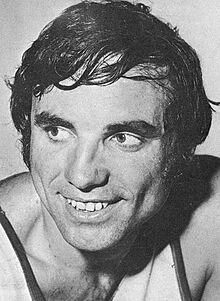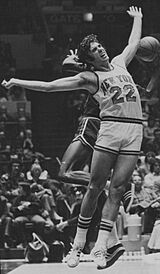Dave DeBusschere facts for kids

DeBusschere, circa 1974
|
|
| Personal information | |
|---|---|
| Born | October 16, 1940 Detroit, Michigan, U.S. |
| Died | May 14, 2003 (aged 62) New York City, U.S. |
| High school | Austin Catholic Preparatory School (Detroit, Michigan) |
| Listed height | 6 ft 6 in (1.98 m) |
| Listed weight | 220 lb (100 kg) |
| Career information | |
| College | Detroit Mercy (1959–1962) |
| NBA Draft | 1962 / Pick: territorial pick |
| Selected by the Detroit Pistons | |
| Pro career | 1962–1974 |
| Career history | |
| As player: | |
| 1962–1968 | Detroit Pistons |
| 1968–1974 | New York Knicks |
| As coach: | |
| 1964–1967 | Detroit Pistons |
| Career highlights and awards | |
|
|
| Career NBA statistics | |
| Points | 14,053 (16.1 ppg) |
| Rebounds | 9,618 (11.0 rpg) |
| Assists | 2,497 (2.9 apg) |
David Albert DeBusschere (born October 16, 1940 – died May 14, 2003) was an amazing American athlete. He was a professional baseball player and a professional basketball player. He even coached basketball!
Dave DeBusschere played baseball for the Chicago White Sox in MLB in 1962 and 1963. He also played basketball in the NBA. He was with the Detroit Pistons from 1962 to 1968. Then he joined the New York Knicks from 1968 to 1974. He also coached the Pistons from 1964 to 1967.
DeBusschere was so good at basketball that he was put into the Naismith Memorial Basketball Hall of Fame in 1983. In 1996, he was named one of the 50 greatest players in NBA history. Later, in 2021, he was honored again as one of the league's best players ever on the NBA 75th Anniversary Team.
Contents
Early Life and School Days
Dave DeBusschere was born in Detroit, Michigan. His parents were Peter Marcell and Dorothy DeBusschere. He went to Austin Catholic Preparatory School. He was so inspiring that fans started a tradition called the "White Shirted Legion." They wore white shirts to games to show their support.
When he was a junior, he was named an all-state player. In his senior year (1957–58), he led his team to win the Michigan Class A high school basketball championship. He scored 32 points in that big game! His team, the Friars, beat Benton Harbor High School and his future NBA rival, Chet Walker.
College Sports Star
Dave DeBusschere was a star in both basketball and baseball at the University of Detroit. In basketball, he scored about 24 points per game. He helped his team reach the National Invitation Tournament twice. They also made it to the NCAA basketball tournament once.
He was also a great pitcher in baseball. He led the Titans to three NCAA baseball tournament appearances. This shows how talented he was in different sports.
Playing Professional Baseball
In 1962, the Chicago White Sox signed Dave DeBusschere to play baseball. He was a pitcher for them in 1962 and 1963. On August 13, 1963, he pitched a "shutout" game. This means the other team didn't score any runs against him! He only gave up six hits and struck out three batters.
He played in the White Sox's minor league teams for two more seasons. But then he decided to stop playing baseball. He wanted to focus on playing and coaching basketball instead. Dave DeBusschere is one of only 13 athletes who have played in both the NBA and Major League Baseball.
Becoming an NBA Legend
Playing for the Detroit Pistons
The Detroit Pistons chose Dave DeBusschere in the 1962 NBA draft. In his first season, he averaged 12.7 points and 8.7 rebounds per game. He was even named to the NBA All-Rookie Team. Unfortunately, he got injured in his second season and only played 15 games. This made it a tough year for the Pistons.
In the 1964–1965 season, when he was only 24, he became the player-coach for the Pistons. This made him the youngest coach in NBA history! But coaching while playing was very hard, so he soon went back to being a full-time player. In 1968, he was traded to the New York Knicks.
Winning with the New York Knicks
Dave DeBusschere joined other future Hall of Fame players on the Knicks. These included Willis Reed, Bill Bradley, and Walt Frazier. Together, they won the NBA championship in 1970. They beat the Los Angeles Lakers in the 1970 NBA Finals.
With another great player, Earl Monroe, they won the championship again in 1973. They beat the Lakers 4–1 in the finals that year.
DeBusschere was put into the Naismith Memorial Basketball Hall of Fame in 1983. He played for 12 years (1962–1974). He averaged 16.1 points and 11 rebounds per game. He was also chosen for eight NBA All-Star teams. In 1996, he became a member of the NBA 50th Anniversary All-Time Team. He was known for playing very tough defense. He was named to the NBA All-Defensive first team six times.
Life After Playing Basketball
Dave DeBusschere stopped playing basketball in 1974. The Knicks later retired his number 22 jersey to honor him. After retiring, he became the commissioner for the American Basketball Association (ABA) in 1975. He helped the ABA and NBA merge together that year.
Later, he worked for the Knicks again in the 1980s. He was the assistant coach and director of basketball operations. He was the one who drafted Patrick Ewing, another Knicks legend, in 1985.
Remembering Dave DeBusschere
Dave DeBusschere passed away in May 2003 from a heart attack. He was in New York City. He was buried in Garden City, New York. He left behind his wife, Gerri, and his children, Peter, Dennis, and Michelle.
To honor him, the University of Detroit Mercy started the Dave DeBusschere Scholarship in 2003. This scholarship helps student-athletes who have good grades and show strong leadership skills.
Dave DeBusschere's NBA Stats
Here are some of Dave DeBusschere's statistics from his time playing in the NBA.
Regular season
| Year | Team | GP | GS | MPG | FG% | 3P% | FT% | RPG | APG | SPG | BPG | PPG |
|---|---|---|---|---|---|---|---|---|---|---|---|---|
| 1962–63 | Detroit | 80 | — | 29.4 | .430 | — | .718 | 8.7 | 2.6 | — | — | 12.7 |
| 1963–64 | Detroit | 15 | — | 20.3 | .391 | — | .581 | 7.0 | 1.5 | — | — | 8.6 |
| 1964–65 | Detroit | 79 | — | 35.1 | .425 | — | .700 | 11.1 | 3.2 | — | — | 16.7 |
| 1965–66 | Detroit | 79 | — | 34.1 | .408 | — | .659 | 11.6 | 2.6 | — | — | 16.4 |
| 1966–67 | Detroit | 78 | — | 37.1 | .415 | — | .705 | 11.8 | 2.8 | — | — | 18.2 |
| 1967–68 | Detroit | 80 | — | 39.1 | .442 | — | .664 | 13.5 | 2.3 | — | — | 17.9 |
| 1968–69 | Detroit | 29 | — | 37.7 | .447 | — | .723 | 12.2 | 2.2 | — | — | 16.3 |
| 1968–69 | New York | 47 | — | 39.4 | .442 | — | .682 | 11.4 | 2.7 | — | — | 16.4 |
| 1969–70 |
New York | 79 | — | 33.3 | .451 | — | .688 | 10.0 | 2.5 | — | — | 14.6 |
| 1970–71 | New York | 81 | — | 35.7 | .421 | — | .696 | 11.1 | 2.7 | — | — | 15.6 |
| 1971–72 | New York | 80 | — | 38.4 | .427 | — | .728 | 11.3 | 3.6 | — | — | 15.4 |
| 1972–73 |
New York | 77 | — | 36.7 | .435 | — | .746 | 10.2 | 3.4 | — | — | 16.3 |
| 1973–74 | New York | 71 | — | 38.0 | .461 | — | .756 | 10.7 | 3.6 | .9 | .5 | 18.1 |
| Career | 875 | — | 35.7 | .432 | — | .699 | 11.0 | 2.9 | .9 | .5 | 16.1 | |
| All-Star | 8 | 1 | 20.9 | .457 | — | .750 | 6.4 | 1.4 | .1 | .0 | 9.6 | |
Playoffs
| Year | Team | GP | GS | MPG | FG% | 3P% | FT% | RPG | APG | SPG | BPG | PPG |
|---|---|---|---|---|---|---|---|---|---|---|---|---|
| 1963 | Detroit | 4 | — | 39.8 | .424 | — | .682 | 15.8 | 1.5 | — | — | 20.0 |
| 1968 | Detroit | 6 | — | 43.8 | .425 | — | .578 | 16.2 | 2.2 | — | — | 19.3 |
| 1969 | New York | 10 | — | 41.9 | .351 | — | .820 | 14.8 | 3.3 | — | — | 16.3 |
| 1970 |
New York | 19 | — | 36.9 | .421 | — | .662 | 11.6 | 2.4 | — | — | 16.1 |
| 1971 | New York | 12 | — | 40.7 | .416 | — | .659 | 13.0 | 1.8 | — | — | 16.4 |
| 1972 | New York | 16 | — | 38.5 | .450 | — | .750 | 12.1 | 2.3 | — | — | 16.6 |
| 1973 |
New York | 17 | — | 37.1 | .442 | — | .775 | 10.5 | 3.4 | — | — | 15.6 |
| 1974 | New York | 12 | — | 33.7 | .380 | — | .621 | 8.3 | 3.2 | .6 | .3 | 12.0 |
| Career | 96 | — | 38.4 | .416 | — | .698 | 12.0 | 2.6 | .6 | .3 | 16.0 | |
See also
 In Spanish: Dave DeBusschere para niños
In Spanish: Dave DeBusschere para niños
- List of National Basketball Association career rebounding leaders
- List of NCAA Division I men's basketball players with 30 or more rebounds in a game
- List of NCAA Division I men's basketball career rebounding leaders
 | Chris Smalls |
 | Fred Hampton |
 | Ralph Abernathy |


